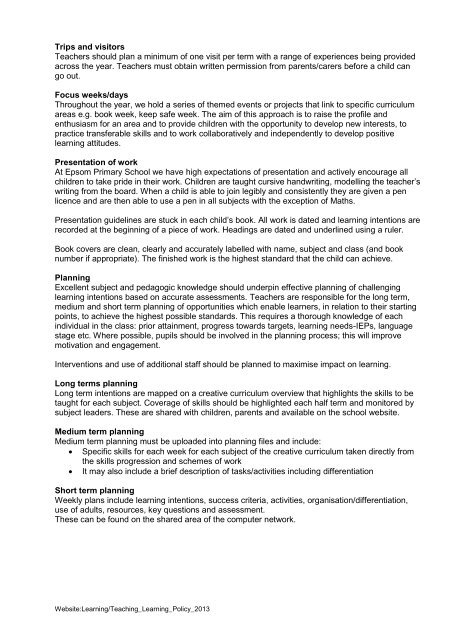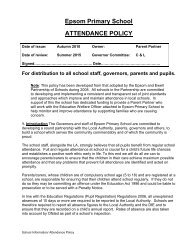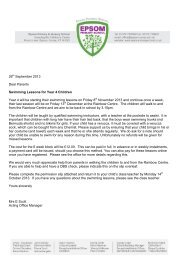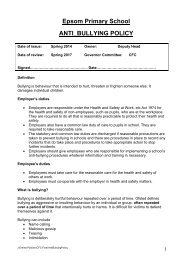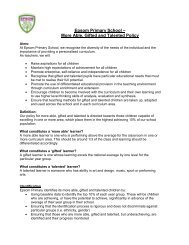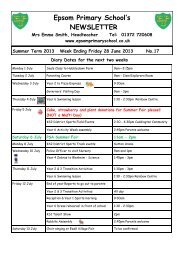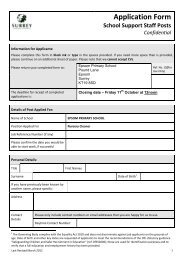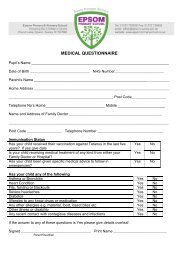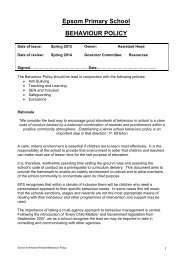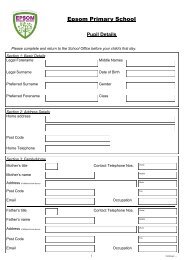Teaching and Learning Policy - Epsom Primary School
Teaching and Learning Policy - Epsom Primary School
Teaching and Learning Policy - Epsom Primary School
Create successful ePaper yourself
Turn your PDF publications into a flip-book with our unique Google optimized e-Paper software.
Trips <strong>and</strong> visitorsTeachers should plan a minimum of one visit per term with a range of experiences being providedacross the year. Teachers must obtain written permission from parents/carers before a child cango out.Focus weeks/daysThroughout the year, we hold a series of themed events or projects that link to specific curriculumareas e.g. book week, keep safe week. The aim of this approach is to raise the profile <strong>and</strong>enthusiasm for an area <strong>and</strong> to provide children with the opportunity to develop new interests, topractice transferable skills <strong>and</strong> to work collaboratively <strong>and</strong> independently to develop positivelearning attitudes.Presentation of workAt <strong>Epsom</strong> <strong>Primary</strong> <strong>School</strong> we have high expectations of presentation <strong>and</strong> actively encourage allchildren to take pride in their work. Children are taught cursive h<strong>and</strong>writing, modelling the teacher’swriting from the board. When a child is able to join legibly <strong>and</strong> consistently they are given a penlicence <strong>and</strong> are then able to use a pen in all subjects with the exception of Maths.Presentation guidelines are stuck in each child’s book. All work is dated <strong>and</strong> learning intentions arerecorded at the beginning of a piece of work. Headings are dated <strong>and</strong> underlined using a ruler.Book covers are clean, clearly <strong>and</strong> accurately labelled with name, subject <strong>and</strong> class (<strong>and</strong> booknumber if appropriate). The finished work is the highest st<strong>and</strong>ard that the child can achieve.PlanningExcellent subject <strong>and</strong> pedagogic knowledge should underpin effective planning of challenginglearning intentions based on accurate assessments. Teachers are responsible for the long term,medium <strong>and</strong> short term planning of opportunities which enable learners, in relation to their startingpoints, to achieve the highest possible st<strong>and</strong>ards. This requires a thorough knowledge of eachindividual in the class: prior attainment, progress towards targets, learning needs-IEPs, languagestage etc. Where possible, pupils should be involved in the planning process; this will improvemotivation <strong>and</strong> engagement.Interventions <strong>and</strong> use of additional staff should be planned to maximise impact on learning.Long terms planningLong term intentions are mapped on a creative curriculum overview that highlights the skills to betaught for each subject. Coverage of skills should be highlighted each half term <strong>and</strong> monitored bysubject leaders. These are shared with children, parents <strong>and</strong> available on the school website.Medium term planningMedium term planning must be uploaded into planning files <strong>and</strong> include: Specific skills for each week for each subject of the creative curriculum taken directly fromthe skills progression <strong>and</strong> schemes of work It may also include a brief description of tasks/activities including differentiationShort term planningWeekly plans include learning intentions, success criteria, activities, organisation/differentiation,use of adults, resources, key questions <strong>and</strong> assessment.These can be found on the shared area of the computer network.Website:<strong>Learning</strong>/<strong>Teaching</strong>_<strong>Learning</strong>_<strong>Policy</strong>_2013


